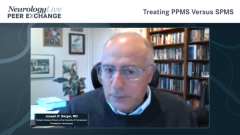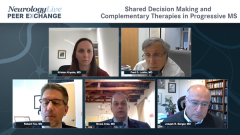
Exercise and MS Fatigue
Considerations regarding the role of exercise and combatting fatigue when treating patients with multiple sclerosis.
Episodes in this series

Bruce Cree, MD: We’ve touched upon nutrition and cognition. What about exercise? Joe, can you comment about exercise in MS [multiple sclerosis]?
Joseph R. Berger, MD: Sure. I recommend exercise for all of my patients, regardless of whether they have MS. It’s important. I do think that exercise in patients with MS is valuable for multiple reasons. These patients often become deconditioned. They also often have problems with their strength and balance. Various forms of exercise, particularly aerobic exercise, can be helpful in that regard.
There’s hardly a patient I see who, when I ask them to do a tandem gait, doesn’t tell me, “I’m better today at it than I was last time I was in the office because I’ve been practicing it.” That’s true of anything we do. If you practice it, you get better at it. In terms of strength and balance, exercise is important.
Another important factor with respect to exercise is maintaining or reducing your weight. As I believe Bob mentioned earlier, one of the things that’s important is to not be obese. Don’t smoke, take your vitamin D, and don’t be obese. Exercise also helps in maintaining the appropriate weight.
A third benefit of exercise is less fatigue. When people exercise, we find that levels of fatigue are improved. Their sleep is also improved. There are many benefits to exercise, and it should be strongly encouraged.
Is there a particular form of exercise that people should engage in? I think it’s a bit like diets. We don’t really have any evidence that there’s a particular form of exercise that is beneficial. It’s important to just get off the chair and get on the exercise bike, treadmill, do Pilates, or whatever you can. That’s what I tell my patients.
Bruce Cree, MD: You didn’t mention squash or racquetball, Joe.
Joseph R. Berger, MD: That’s true, I didn’t and I don’t. It’s usually a little too vigorous.
Robert Fox, MD: I would also add that mood is known to improve with exercise.
Joseph R. Berger, MD: Precisely. Good point.
Robert Fox, MD: With depression being as common as it is in patients who have MS, there is evidence and some trials now underway to evaluate the direct impact of routine exercise on mood.
I tell my patients that the best exercise for MS is the one they like to do. Because that’s the one they’re more likely to do. If you tell Joe to do yoga, he’ll laugh at you. But if you tell Joe to go play racquetball or squash, he’ll be on the court this afternoon. The most important thing is the exercise that the patient likes to do. Aligning your recommendations with their preference is key.
Bruce Cree, MD: Exercise is important. Fred, what do you do with your patients who are combating fatigue? How do you evaluate fatigue, and then what do you do about it?
Fred D. Lublin, MD: First, try to determine whether it’s the true fatigue of MS, fatigue from being depressed, or fatigue because they’re not sleeping well enough. That’s not all that difficult to sort through. The one that’s probably the easiest to deal with first is sleep. We do a sleep hygiene assessment to try to sort that out. Then we do simple things. We ask people specifically about whether they’re having spasms at night that are waking them up. They don’t have to be painful. They could just be spasms that wake you up. So you work on sleep hygiene.
Mood is an important one. We deal with that. If that all works, then you get a good description of fatigue, which is different from what ordinary people think of fatigue. Sometimes the patients can’t describe it, but you hear it enough from them when they say it’s different, or it’s not like when they have the flu or any of that sort of thing.
Then we try to treat it. If it’s depression, you treat their mood. If it’s sleep, you deal with sleep problems. The problem with trying to treat fatigue pharmacologically is that the data are so bad. The TRIUMPHANT-MS study was just published, which said, “We don’t think any of these work, except for maybe sleep issues.” But when we discussed this during our ACTRIMS [Americas Committee for Treatment and Research in Multiple Sclerosis] course, most of the clinicians said, “We saw that data, but it wasn’t a responder analysis,” which is an important critique.
I try these various agents, modafinil or amantadine, because as with any of the symptom management medications, you can determine pretty quickly whether you’re doing anything. You could try it for a couple of weeks. If it helps, there’s not much cost to it because they’re pretty well-tolerated. I do avoid stimulants because I don’t like to get into those. But I will try things like modafinil or amantadine.
Bruce Cree, MD: Thank you for watching this NeurologyLive® Peer Exchange. If you enjoyed the content, please subscribe to our e-newsletters to receive upcoming Peer Exchanges and other great content right in your inbox.
Transcript Edited for Clarity
Newsletter
Keep your finger on the pulse of neurology—subscribe to NeurologyLive for expert interviews, new data, and breakthrough treatment updates.



























